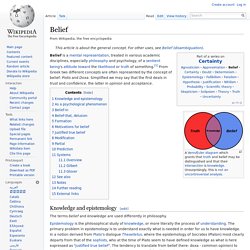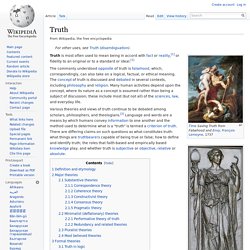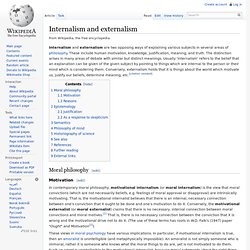

Knowledge that, knowledge how, and knowledge by acquaintance. Belief. Belief is a mental representation, treated in various academic disciplines, especially philosophy and psychology, of a sentient being's attitude toward the likelihood or truth of something.[1] From Greek two different concepts are often represented by the concept of belief: Pistis and Doxa.

Simplified we may say that the first deals in trust and confidence, the latter in opinion and acceptance. Knowledge and epistemology[edit] The terms belief and knowledge are used differently in philosophy. As a psychological phenomenon[edit] Truth. Truth is most often used to mean being in accord with fact or reality,[1] or fidelity to an original or to a standard or ideal.[1] The commonly understood opposite of truth is falsehood, which, correspondingly, can also take on a logical, factual, or ethical meaning.

The concept of truth is discussed and debated in several contexts, including philosophy and religion. Many human activities depend upon the concept, where its nature as a concept is assumed rather than being a subject of discussion; these include most (but not all) of the sciences, law, and everyday life. Definition and etymology[edit] An angel carrying the banner of "Truth", Roslin, Midlothian. Justification.
Internalism and externalism. Internalism and externalism are two opposing ways of explaining various subjects in several areas of philosophy.

These include human motivation, knowledge, justification, meaning, and truth. The distinction arises in many areas of debate with similar but distinct meanings. Usually 'internalism' refers to the belief that an explanation can be given of the given subject by pointing to things which are internal to the person or their mind which is considering them. The value problem.